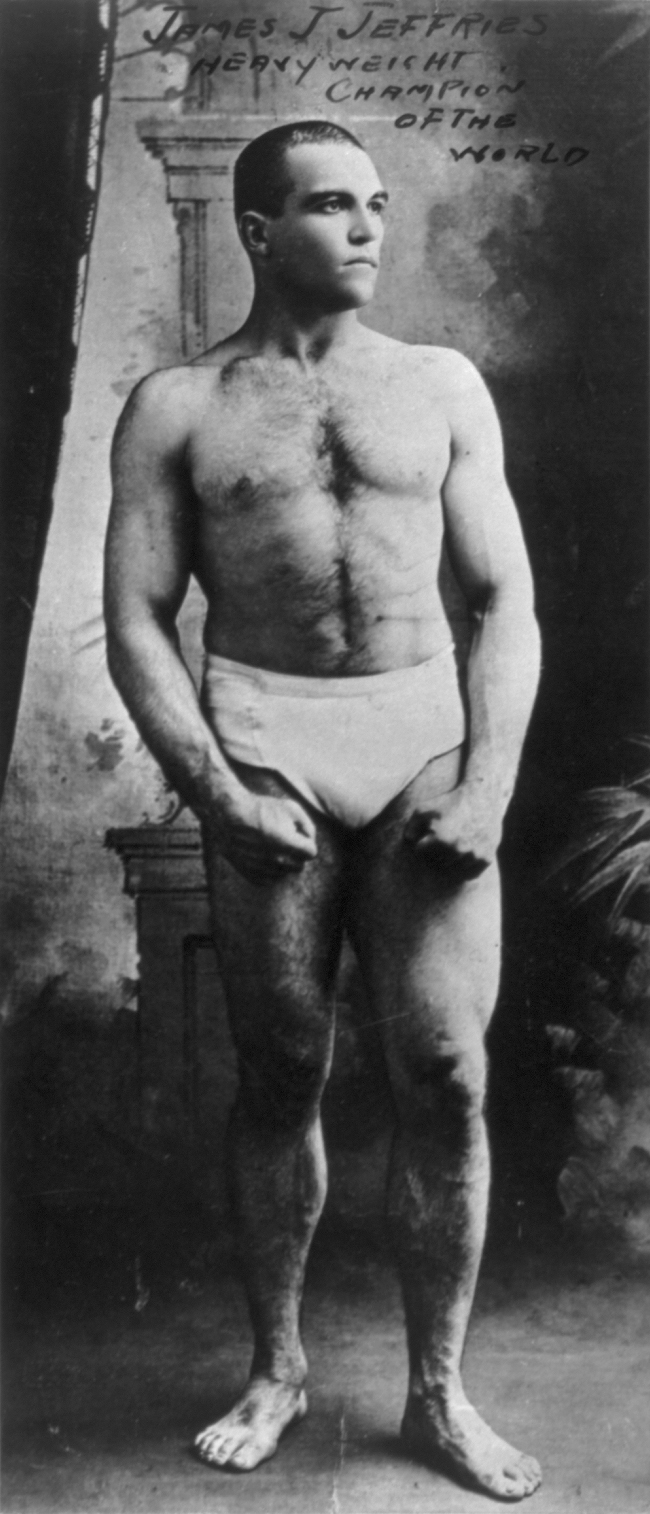Jeffries KOs Corbett
日に 11, 1900, World Heavyweight Boxing Champion James J. Jeffries fought his former employer James J. Corbett. Corbett held the World Heavyweight Boxing Championship in the early 1890s. Corbett hired the powerfully built Jeffires to help him prepare for his title challengers. Jeffries went on to win the world title from the man, who beat Corbett, Bob Fitzsimmons.
Corbett was a smaller heavyweight, so he employed Jeffries, who possessed an impressive physique for the early Twentieth Century to mimic the power he often faced in his title defenses. Corbett used his speed and elusiveness to avoid heavy blows. Skillfully working off his jab, Corbett would counter strike of the misses of his adversary.

James J. Jeffries from the Library of Congress archive
で 1897, Corbett fought former light heavyweight boxing champion Bob Fitzsimmons. Fitzsimmons could generate powerful blows with his slender frame. Robbed of the speed advantage against the slightly smaller Fitzsimmons, Corbett was felled by a body shot in the 14th round.
Fitzsimmons held the belt for two years but only made one defense before fighting Jeffries in June 1899. Fitzsimmons supplemented his income by performing in stage plays, a common tactic of both professional boxers and wrestlers of the time. The inactivity did not help Fitzsimmons. Jeffries knocked him out in the 11th round.
James J. Jeffries wanted to cement his standing as the best heavyweight boxer in the world. When James J. Corbett wanted a shot at his former title, Jeffires was happy to oblige.
A pair of Californians, Jeffries and Corbett fought their battle in New York City. The men battled at the Seaside Athletic Club on Coney Island. The promoter booked the bout for 25 rounds.
When the doors opened on May 11, 1900, 8,000 spectators piled into the sold out venue. The gate for the bout was $34,000. The winner would take home $15,000, while the loser would be consoled with $5,000.
As the men entered the ring, the physical disparity was obvious. Jeffries and Corbett both stood about 6’01” or 6’02”. <スパンbbox_x = "14" fweight = "3"赤= "255"緑= "255"青= "255"アルファ= "=" 244 "bbox_y =" 627 "bbox_w =" 56 "bbox_h =" 20 "FSIZE, Jeffries dwarfed Corbett, who entered the ring at 185 ポンド. Jeffries weighed a massive 210 ポンド.
Despite the tremendous size difference, Jeffries nearly lost this bout. The 33-year-old Corbett was nine years older than Jeffries but Corbett looked the younger fighter. Jeffries continually charged at Corbett, who stepped aside and peppered his former pupil.
If the bout had gone the full 25 rounds, Corbett would undoubtably have won the decision. <スパンbbox_x = "14" fweight = "3"赤= "255"緑= "255"青= "255"アルファ= "=" 244 "bbox_y =" 627 "bbox_w =" 56 "bbox_h =" 20 "FSIZE, Jeffries finally got the visibly fatiguing Corbett in the corner during the 23rd round. Jeffries threw a powerful left over Corbett’s guard. It would prove to be the money shot as Corbett slumped into the corner unconscious.
Jeffries went back to his corner obviously relieved that his title did not slip through his fingers. Jeffries would fight Corbett again in 1903. Jeffries was triumphant after only 10 rounds in the rematch. Corbett would not challenge for his former title again.
James J. Jeffries proved a powerful fighter. He needed all of his power against the challenge of his former boss and heavyweight champion, James J. Corbett.
You can leave a comment or ask a question about this or any post on my Facebookページ.
Source: セント. ルイ·ポストディスパッチ, 5月 12, 1900 edition, P. 1
Pin It
